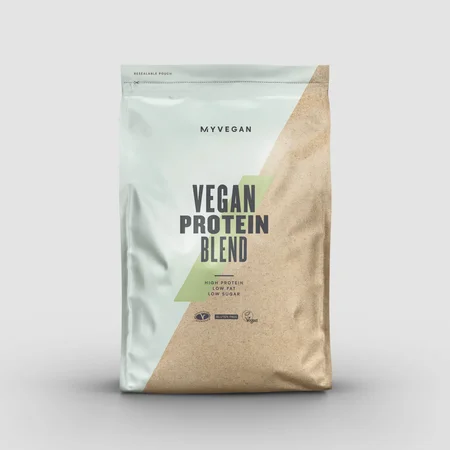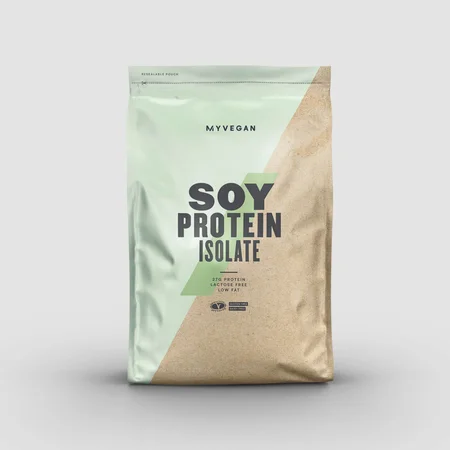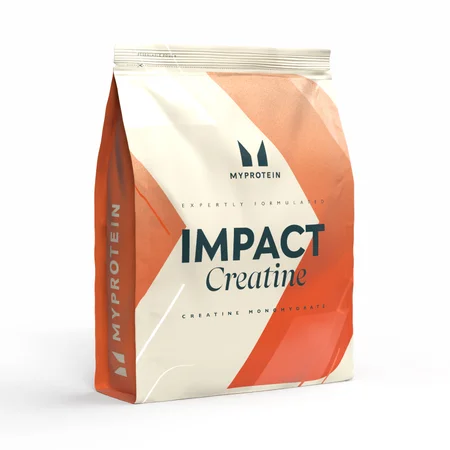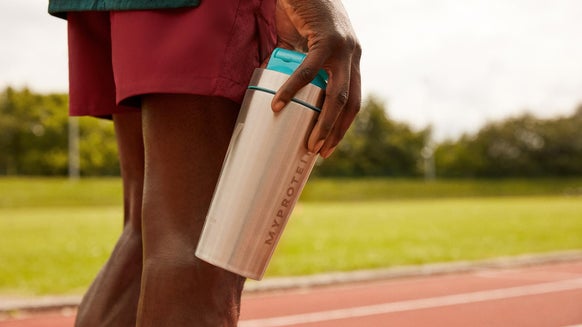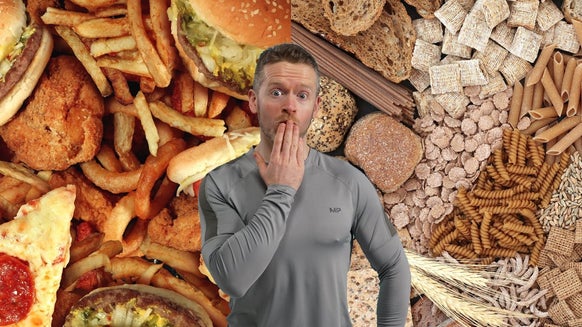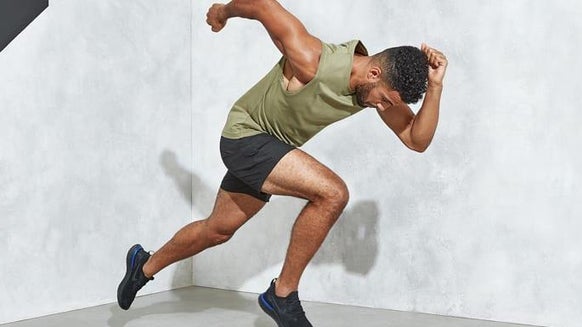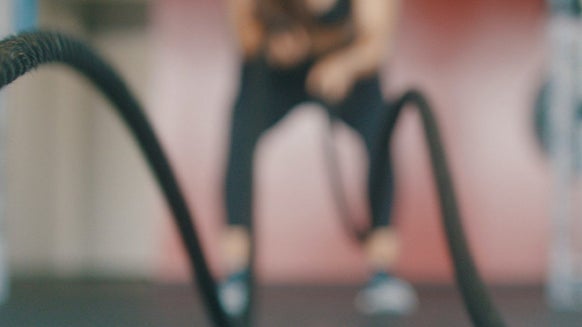Best Vegan Supplements For Training & Bodybuilding
As the community of solely plant-powdered athletes grows, more and more health and fitness enthusiasts are looking for plant-based alternatives to traditional sports supplements.
Whether it's for ethical, environmental, health reasons, or just freedom of choice, veganism is becoming an increasingly attractive option.
In this article, we'll outline some of the absolute best vegan supplements for training and bodybuilding, including their benefits, optimal dosages, and where you may need more than you might realise.
- Do I need supplements as a vegan?
- What vitamins do I need as a vegan?
- What are the best vegan supplements for building muscle?
Struggling to pick the right vegan protein powder for you? Richie has the answers...
Do I need supplements as a vegan?
A vegan lifestyle, while considered to be beneficial for an individual’s physical and mental health, can impact a person's nutritional needs as some essential nutrients are primarily found in animal-derived foods.
Some of the key nutrients vegans may be deficient in include protein, calcium, vitamin B12, vitamin D, and iron (1).
While supplements aren’t always a necessity introducing specific supplements into a vegan diet will make achieving your nutritional needs, particularly if you’re training intensely and developing lean muscle, much more practical, cost-effective, and consistent.
What vitamins do I need as a vegan?
More plants are certainly great for our health but, as a lifestyle and dietary approach, adopting veganism cuts out a number of nutrient dense foods as well (which contain nutrients, vitamins and minerals critically important for our health, performance and recovery).
Here are the most important vitamins and minerals to consider supplementing with to avoid any possible deficiencies, and why these are so critically important for your health, training and building muscle.
Calcium
Calcium is essential for strong bones and teeth and is typically found in dairy products. Calcium also plays a part in regulating blood clotting, muscle contraction and our heart beat.
Those following a plant-based diet approach tend to have the lower recorded intakes of dietary calcium which does increase the risk of deficiency. (1)
Being deficient carries many risks, with the most well known being an increased risk of bone fracture. Fractures have been found more commonly in vegans which is an understandable concern for those who train intensely.(2)
While calcium deficiencies aren’t as common as other nutrient deficiencies (because many vegan friendly foods and drinks are fortified with calcium nowadays) it’s still recommended that vegan athletes consider supplementation.
Vitamin B12
Vitamin B12 (otherwise known as cobalamin) plays an incredibly important role in the formation and function of our central nervous system as well as ensuring our metabolism is functioning correctly (so that we can produce the energy we need and all the other important metabolic shenanigans).
Vegetarians have been found to be deficient in vitamin B12 with vegans found to be even more so. (3)
It’s really quite important, and virtually universally recommended, that those following a plant-only diet approach supplement with vitamin B12 to avoid any of the health risks that come along with deficiency.
Well, a 2019 study in vegan runners found when they were provided with a B12 supplement the athlete’s blood concentrations fell within the desired range.(4)
The researchers concluded “…a well-planned, health-conscious lacto-ovo-vegetarian and vegan diet, including supplements, can meet the athlete’s requirements of vitamin B12…”.
Iron
Iron plays a critical role in energy metabolism as well as the function and production of our red blood cells (the handy little things that carry oxygen around our body and keep us alive).
The predominant source of iron in the human diet is red meat and other animal products (which provides an obvious issue to our plant-based Myprotein team).
While iron is found in a range of plant-based foods it’s unfortunately found in what’s described as its “non-heme” form.
This form of iron is not as well absorbed in the gut or as readily usable by the human body when compared to “heme” form (found in animal based foods).(5)
The reason why non-heme iron is less bioavailable, compared to heme iron, is due to the presence of naturally occurring absorption inhibitors, which mainly include phytate, oxalate, and polyphenols.
The plant sources we rely on for iron intake are, rather frustratingly, the source which are richest in these “blockers”.
This, in tandem with restriction of animal sources, likely explains why vegans have been found to be more likely to be iron deficient than non-vegans.(1)
Supplementing with a more absorbable form of iron would be advised, especially for women and or highly active individuals as their iron demands are even greater than the daily recommended.(6)(7)
Zinc
Supplementing with zinc has benefits for several reasons, especially if they’re training and trying to gain muscle.
While zinc is most popularly known for its role in regulating immune function and helping to reduce the risk of infections (especially in athletes who may be more susceptible to illness and injury), it also plays an important role in muscle growth and recovery.
Zinc is not only involved in protein synthesis, which is necessary for muscle growth and recovery but also the overall function of active muscle.
A deficiency in zinc can impair muscle growth, lead to a reduction in muscle size and performance as well as increase the risk of injury.(8)
Zinc is found primarily in animal-derived foods. Good sources of zinc include meat, poultry, and seafood.
While zinc is found in some plant-based foods, such as whole grains, legumes, and nuts, the body may have difficulty absorbing zinc from these sources. Similarly to iron, this is due to the presence of inhibiting compounds like phytates (commonly found in these foods).
In fact, it’s been previously suggested that plant-based dieters may need to consume up to 50% more dietary zinc due to lower absorption.(9)
Zinc requirements may also be higher for athletes.
Endurance and strength training can increase the body's demand for zinc and athletes, especially those who engage in intensive training, may need more zinc than sedentary individuals.(10)
Iodine
Iodine is an essential mineral that’s needed for the production of thyroid hormones. These regulate the body's metabolism and energy levels.
It’s also important for the growth and development of the brain and nervous system, as well as for immune function.
Vegan athletes may be at risk for iodine deficiency because iodine is found primarily in animal-derived foods, such as dairy products, seafood, and eggs.
In previous studies, up to 80% of vegan athlete populations have been found to be deficient in Iodine.(11)
While some plant-based sources of iodine, such as seaweed, are available, the amount and bioavailability of iodine can vary depending on the source.
Additionally, it’s been found vegans consume both excessively high and low intakes depending on their dietary choices with great proportions of groups found to be deficient.(12)
And just like with zinc, endurance and strength training’s been seen to increase the body’s demand for iodine. So vegans hitting their training hard may need more iodine than those who move at a slower pace.(12)
Deficiency in iodine can also impair thyroid function, leading to fatigue, weight gain, and other health issues.
Omega 3 Fatty Acids
Omega 3s are predominantly found in oily fish and other marine sources.
They play an incredibly important role in the health of our brain, cognition, heart, overall physical and mental health.(13)
The healthier the athlete is the greater their ability to perform to their utmost and recover optimally.
Additionally, there may be some added benefit to increasing omega 3 intake and improving body composition as well as increasing lean muscle mass.(14)
Omega 3 fatty acids are also considered essential as we’re not capable of producing them ourselves so we have to rely on our diet to achieve our needed intake.
Studies have shown that vegan groups possess lower levels of omega 3s than omnivorous diets and even vegetarian diets.(12)
Whilst there are plenty of plant sources of omega 3s (for example; chia seeds, flax seeds, walnuts and more) it may not be efficient or practical to achieve daily intakes from these foods.
There’s also some evidence to suggest these sources may not be effective at raising omega 3 concentrations in the body. However, algae-based omega 3 supplements (those which are vegan friendly) significantly improved omega 3 concentrations. (15)
Using an omega 3 supplement (which sources its omega 3 fatty acids from algae) can be a more efficient alternative and, much like protein, more cost, time and calorie effective.
Which are the best vegan supplements for building muscle?
Over the last few years, the range of performance, recovery and muscle building supplements available to vegan fitness enthusiasts has grown exponentially, and rightfully so.
Here are a few of the must have vegan supplements which will help making plant-based gains all the easier.
A vegan protein powder
This suggestion comes purely from a place of practicality.
Recommended protein intakes are readily achievable following a vegan approach (although some studies show many fail to meet recommended intakes) when you factor in the contributions of beans, lentils, soy products, nuts, seeds, veggies and more. (1)(12)
Athletes require higher levels of protein intake to ensure they’re recovering from, and adapting to, the exercise they’re engaging in as well as performing at their best.(16)
This may not be as easily achievable relying on whole foods sources, given that recommendations range between 1.6 to 2.2g of protein per kg of bodyweight.(16)
Introducing a vegan protein powder (such as a plant protein vegan blend, a soy based powder or one of the many other options Myprotein offer) would make for a highly cost, calorie and time efficient addition to the pantry of vegan community members interested in building muscle.
Creatine
Creatine acts as an energy recycler, helping to replenish ATP — adenosine triphosphate in case you need it for the pub quiz.
ATP is the molecule we use to perform just about everything. From movement, to repair and even memory formation, if it needs energy, it’s ATP we turn to.
When we perform certain kinds of movements (high intensity, short duration movements) we rely very heavily on ATP.
If ATP depletes faster than we can replenish it during these exercise movements we may not be able to complete the number of reps we wish or achieve the level of force output we’re after.
As mentioned, creatine replenishes ATP and creatine supplementation has been shown to significantly improve strength performance when supplemented over time.(17)
Supplementation benefits aren’t immediate and creatine must first saturate the muscle before we can reap the rewards.
These associated rewards likely result from creatine's effect on increasing power output, how it influences muscle growth and even its influence on cell-to-cell signalling.
Creatine can be absorbed through dietary intake but it’s only found in certain animal products (steak being one of the most well-known sources).
Thus, vegan athletes may wish to consider supplementing with creatine to improve their performance and gain additional muscle mass.(12)
Creatine supplementation is typically taken in two ways. Loading or taking it more consistently.
The difference is that a loading phase will lead to the benefits of supplementation occurring faster (however can upset some people's gut).
Loading (for faster results)
20g per day split into two 10g servings for 10 days
4–6g per day in one serving (post workout is preferable but not essential) for three weeks.
Repeat this cycle and there’s no need to ever stop taking it.
Consistent intake
4–6g per day on a consistent, day by day basis.
Beta-Alanine
The final supplement I’m going to explain is beta-alanine.
While there are many more I could write about, I thought I’d highlight those with the most supporting research and that would offer the greatest bang for your buck.
Beta-alanine is a non-essential amino acid that helps increase muscle carnosine levels, which in turn can help delay muscle fatigue during high-intensity exercise.
This can allow for more time under tension, leading to greater muscle activation and growth.(18)
By improving muscle endurance, beta-alanine can help improve overall athletic performance, particularly in activities that require short bursts of high-intensity effort, such as weightlifting and sprinting.
Unlike many other traditional supplements, beta-alanine is suitable for vegans. It can be synthesised in the lab and is also found in some plant-based foods, such as whole grains and legumes.
Beta-alanine is the perfect partner in crime to creatine and would form a robust foundation of performance and recovery related supplements that will support you in building that desired lean muscle mass.
Aim to take 1.5g of beta-alanine either side of training in the early stage (and 3g on your rest days) and scale that up to 3g of beta-alanine either side of training (and 6g on your rest days) as you become more accustomed to the tingling sensation that can come along with supplementation (which is totally harmless by the way).
Take Home Message
One of the greatest misconceptions of a plant-based diet is that it’s not conducive to developing lean muscle mass. That’s total nonsense.
As long as you’re training hard, smart, and fuelling yourself as well as recovering adequately, then you’ll gain more muscle.
Vegans do have to be mindful of the possible nutritional inadequacies that come along with a plant-based diet but we’ve got you covered in this article.
I’d highly advise investing in some of the more necessary supplements that were highlighted and would ask you to seriously consider the muscle building supplements that were suggested.
If you want to make some serious plant-based gains then those would be an incredibly useful part of your muscle building puzzle.

- Bakaloudi, D.R. et al. (2021) “Intake and adequacy of the vegan diet. A systematic review of the evidence,” Clinical Nutrition, 40(5), pp. 3503–3521. Available at: https://doi.org/10.1016/j.clnu.2020.11.035.
- Tong, T.Y. et al. (2020) “Vegetarian and vegan diets and risks of total and site-specific fractures: Results from the prospective epic-oxford study,” BMC Medicine, 18(1). Available at: https://doi.org/10.1186/s12916-020-01815-3.
- Pawlak, R., Lester, S.E. and Babatunde, T. (2014) “The prevalence of cobalamin deficiency among vegetarians assessed by serum vitamin B12: A review of literature,” European Journal of Clinical Nutrition, 68(5), pp. 541–548. Available at: https://doi.org/10.1038/ejcn.2014.46.
- Nebl, J. et al. (2019) “Micronutrient status of recreational runners with vegetarian or non-vegetarian dietary patterns,” Nutrients, 11(5), p. 1146. Available at: https://doi.org/10.3390/nu11051146.
- Pawlak, R., Berger, J. and Hines, I. (2016) “Iron status of vegetarian adults: A review of literature,” American Journal of Lifestyle Medicine, 12(6), pp. 486–498. Available at: https://doi.org/10.1177/1559827616682933.
- Beard, J. (2000) Iron Requirements in Adolescent Females, The Journal of Nutrition, Volume 130, Issue 2, Pages 440S–442S, https://doi.org/10.1093/jn/130.2.440S
- Nielsen P, Nachtigall D. Iron supplementation in athletes. Current recommendations. Sports Med. 1998 Oct;26(4):207-16. doi: 10.2165/00007256-199826040-00001. PMID: 9820921.
- Hernández-Camacho, J. D., Vicente-García, C., Parsons, D. S., & Navas-Enamorado, I. (2020). Zinc at the crossroads of exercise and proteostasis. Redox biology, 35, 101529. https://doi.org/10.1016/j.redox.2020.101529
- Institute of Medicine (US) Panel on Micronutrients. (2001). Dietary Reference Intakes for Vitamin A, Vitamin K, Arsenic, Boron, Chromium, Copper, Iodine, Iron, Manganese, Molybdenum, Nickel, Silicon, Vanadium, and Zinc. National Academies Press (US).
- Chu, A., Holdaway, C., Varma, T., Petocz, P., & Samman, S. (2018). Lower Serum Zinc Concentration Despite Higher Dietary Zinc Intake in Athletes: A Systematic Review and Meta-analysis. Sports medicine (Auckland, N.Z.), 48(2), 327–336. https://doi.org/10.1007/s40279-017-0818-8
- Krajcovicová-Kudlácková, M., Bucková, K., Klimes, I., & Seboková, E. (2003). Iodine deficiency in vegetarians and vegans. Annals of nutrition & metabolism, 47(5), 183–185. https://doi.org/10.1159/000070483
- Rogerson D. (2017). Vegan diets: practical advice for athletes and exercisers. Journal of the International Society of Sports Nutrition, 14, 36. https://doi.org/10.1186/s12970-017-0192-9
- Yashodhara, B.M. et al. (2009) “Omega-3 fatty acids: A comprehensive review of their role in health and disease,” Postgraduate Medical Journal, 85(1000), pp. 84–90. Available at: https://doi.org/10.1136/pgmj.2008.073338.
- Gammone, M. A., Riccioni, G., Parrinello, G., & D’Orazio, N. (2018). Omega-3 Polyunsaturated Fatty Acids: Benefits and Endpoints in Sport. Nutrients, 11(1), 46. https://doi.org/10.3390/nu11010046
- Lane, K.E. et al. (2021) “Bioavailability and conversion of plant based sources of omega-3 fatty acids – a scoping review to update supplementation options for vegetarians and vegans,” Critical Reviews in Food Science and Nutrition, 62(18), pp. 4982–4997. Available at: https://doi.org/10.1080/10408398.2021.1880364.
- Jäger, R., Kerksick, C.M., Campbell, B.I. et al. (2017). International Society of Sports Nutrition Position Stand: protein and exercise. J Int Soc Sports Nutr 14, 20. https://doi.org/10.1186/s12970-017-0177-8
- Kreider, R.B., Kalman, D.S., Antonio, J. et al. (2017) International Society of Sports Nutrition position stand: safety and efficacy of creatine supplementation in exercise, sport, and medicine. J Int Soc Sports Nutr 14, 18 (2017). https://doi.org/10.1186/s12970-017-0173-z
- Trexler, E.T., Smith-Ryan, A.E., Stout, J.R. et al. (2015) International society of sports nutrition position stand: Beta-Alanine. J Int Soc Sports Nutr 12, 30. https://doi.org/10.1186/s12970-015-0090-y
